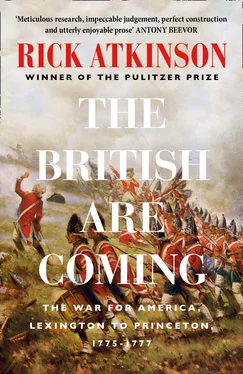For reasons never explained and certainly never understood, when the conference ended Prescott ordered the column to continue southeast. Colonel Gridley quickly staked out a redoubt—an imperfect square with sides about 130 feet long— not on nearly impregnable Bunker Hill, as the Committee of Safety had specified, but on the southwest slope of Breed’s pastureland. Accustomed to pick-and-shovel work, the men grabbed tools from the carts and began hacking at the hillside. Striking clocks in Boston, echoed at higher pitch by a ship’s bell, told them it was midnight.
The rhythmic chink of metal on hard ground carried to the Lively , another of those leaky vessels in the British squadron, now anchored astride the Charlestown ferryway. As coral light seeped across the eastern horizon at four a.m. on Saturday, June 17, the graveyard watch officer strained to decipher the odd sounds above the groan of the ship’s yards and the Charles whispering along her hull. He summoned the captain, whose spyglass soon showed hundreds of tiny dark figures tearing at the distant slope with spade and mattock.
The ship beat to quarters. Sailors tumbled from their hammocks, feet clapping across the deck as they ran to their battle stations. A windlass groaned as the crew winched Lively on her cable to align the starboard cannons. A shouted command carried across the gun deck, and tongues of flame burst from the ship in a broadside of 9-pounders. Breeching ropes kept the guns from flying across the deck in recoil; block and tackle ran them forward for the next salvo. Gunners swabbed the smoking barrels, rammed home powder and shot, and another flock of iron balls flew toward Breed’s Hill. Other ships eventually joined in— Glasgow , Symmetry , Falcon , Spitfire , more than seventy guns all told—along with 24-pounders from the Copp’s Hill battery in Boston’s North End.
Dawn, that great revealer of predicaments, had fully disclosed Colonel Prescott’s. Screaming cannonballs—“tea kettles,” in rebel slang—streaked overhead or punched into the hillside, smashing two hogsheads containing the American water supply. “The danger we were in made us think there was treachery, & that we were brought here to be all slain,” young Peter Brown would write his mother in Rhode Island. Distance and elevation reduced the bombardment’s effect, although Prescott recounted how one militiaman whose head abruptly vanished in a crimson mist “was so near me that my clothes were besmeared with his blood and brains, which I wiped off in some degree with a handful of fresh earth.” When other men dropped their tools to gawk at the corpse, Prescott snapped, “Bury him,” then strolled off with conspicuous nonchalance, hatless now, waggling his sword and urging the men to dig faster.
The redoubt taking shape was formidable enough, with thick dirt walls six feet high, fire steps for musketmen inside to stand on, and a sally port exit to the north. But no embrasures had been left for cannons; worse yet, Prescott recognized that the British could outflank him on either side. Gage’s men would no doubt attack in force across the Charles, seeking to stun the defenders with firepower before closing to complete the slaughter with bayonets. To protect his left flank, Prescott ordered the men to begin building a low breastwork northeast from the sally port to marshy ground at the foot of Breed’s Hill.
He also sent an officer to plead for reinforcements, provisions, and water. Artillerymen refused to lend the courier a horse, forcing him to walk four miles to Cambridge, which he found “quiet as the Sabbath.” At Hastings House he discovered Dr. Warren, newly appointed as a major general despite his lack of military experience, splayed on an upstairs bed with a crippling headache. General Ward, tormented with another attack of the stone, fretted over the vulnerability of Roxbury, the Dorchester Heights, and his Cambridge supply dumps; British gunfire had been reported at Boston Neck. Not least, Ward worried that only twenty-seven half-barrels of powder remained in his magazines, perhaps enough for forty thousand cartridges. With consent from the Committee of Safety, he reluctantly agreed to send reinforcements to Prescott from the New Hampshire militia camped along the Mystic.
The deep boom of Lively ’s broadsides had wakened General Gage, as it woke all of Boston. Province House, aglitter in candlelight, soon bustled with red uniforms. Messengers skipped up the broad stone steps from Marlborough Street with news of rebel entrenchments, then skipped back down with orders to find and fetch various commanders. Young officers eager to join the coming attack loitered in the hallway, hoping to be noticed. Sleepy aides fumbled about for decent maps, of which the British still had precious few. Concussion ghosts from the harbor bombardment rattled the windows, and the rap of drums beating assembly carried from the camps.
Several senior officers joined Gage in the council chamber, including Percy, who arrived from his house in nearby Winter Street. But it was three newcomers who drew the eye this morning: Major Generals William Howe, John Burgoyne, and Henry Clinton had reached Boston in late May aboard the Cerberus , after a stormy voyage that killed two favorite horses but gave the three men ample time to find common ground for the campaign ahead despite their inevitable rivalry. “The sentiments of Howe, Clinton, and myself have been unanimous from the beginning,” Burgoyne declared. The king had personally approved their selection, fearing that without vigorous new leadership in America “we shall only vegetate.” They were deemed “the fittest men for the service in the army,” as one official in London observed, forming what Burgoyne called “a triumvirate of reputation.”
Others were not so sure. Horace Walpole, ever astringent, told his diary that Howe “was reckoned sensible, though so silent that nobody knew whether he was or not,” while Burgoyne was “a vain, very ambitious man, with a half understanding that was worse than none.” Clinton, he declared, “had not that fault, for he had no sense at all.” Their arrival at Long Wharf aboard a frigate named for the mythical three-headed hound guarding the gates of Hades inspired the war’s most enduring doggerel: “Behold the Cerberus , the Atlantic plough, / Her precious cargo, Burgoyne, Clinton, Howe, / Bow, wow, wow!” Thereafter known as the three bow-wows, they had wasted little time in undercutting Gage’s authority, as in Burgoyne’s barbed observation to General Harvey earlier that week that it was “no reflection to say he is unequal to his present station, for few characters in the world would be fit for it.… It requires a genius of the very first class.”
As the windows trembled and the Old South clock across the street struck the hours, the high command, genius or otherwise, heatedly debated what to do. General Clinton, a dimple-chinned, prickly, and gifted tactician, proposed the boldest course. Early that morning, he had made his own reconnaissance in the dark along the Boston waterfront, listening to the racket from the rebel entrenchment. If Howe and the main British force crossed directly from the North End to Charlestown, Clinton would lead five hundred men ashore in a surprise flanking attack within musket shot of the isthmus, severing the American line of retreat and trapping the enemy on the peninsula.
This scheme found little favor around Gage’s council table. Dividing the force would risk defeat in detail of the separate detachments, particularly if thousands of rebel reinforcements stormed the battlefield from Cambridge. Naval support would be tenuous: even shallow-draft vessels had difficulty in the Mystic, which had not been thoroughly sounded, and a milldam west of Charlestown Neck complicated navigation there. No one had forgotten Diana ’s fate in shoal water. Every small boat would be needed to ferry at least fifteen hundred regulars from Boston to Morton’s Point on the peninsula. The amphibious assault would have to be made at “full sea”—high tide, close to three p.m.—so that artillery could be manhandled onto dry land rather than through the muddy shallows.
Читать дальше












